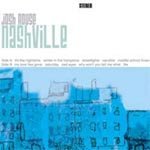
Josh Rouse Nashville
(Rykodisc)
I grew up on AM radio in the seventies. I refer to the formative period that runs from age 4, when you first become aware of music, to about age 12, where the age of musical obsession and discerning choices begins (for those so inclined). For me, this span ran from 1971-1979, and so I cut my teeth on a catalog alternately cheesy and adventurous. The AM stations played hits by Abba, the Bee Gees and Elton John, but also extended pieces like Harry Chapin's Taxi and Don McClean's American Pie. One genre that dominated the dial was Southern Californian Rock. This was characterized by breezy, driving with the top down, sun-drenched songs, with a sound open as the western frontier. Practitioners included the radio friendly Eagles, Linda Ronstadt, Jackson Browne as well as the infinitely more interesting Randy Newman and Warren Zevon. The SoCal sound has reemerged recently, thanks in part to Wilco's landmark Yankee Hotel Foxtrot, whose Jesus, etc could have easily been an outtake from Hotel California. And now, Josh Rouse and his producer Brad Jones, have channeled the seventies' AM dial and the SoCal sound for their new release, Nashville.
This is the year's first great summer album, a categorization recognizable to anyone who experiences the full swings of the seasons. Living in a part of the US known for its brutal winters, I could never get used to listening to Bob Marley in January. Nashville kicks off the spring thaw with a set of laid back, acoustic tunes, peppered with pedal steel, Hammond organ, and the smooth vocal stylings of Mr. Josh Rouse. The key to getting that summery, SoCal feel is in the uncluttered arrangements and the judicious use of large hall reverb that gives the impression of open spaces and freedom of movement. Think of classic tunes like Take it Easy or Doctor My Eyes and you'll know what I mean. You can hear every instrument and the air between them. The eighties killed this idiom, so widely employed in the mid-seventies, as the open spaces were relentlessly plugged by synths and drum programming and the echo chamber constricted and hardened into the shape of a lead pipe.
When the synth does appear on Nashville, in a wonderful song like Our Love is Gone, it's used not as a blanket, but as a supporting player, emerging briefly to play some well placed fifths. But the major players here are the acoustic guitar and pedal steel. It's the Night Time sets the mood immediately in the albums opening seconds, entering like a warm breeze, and Rouse never wanders far from that winning formula. Hooks abound and the hits would keep coming in the black is white, up is down, Hot 100 of Indyworld. But living in the "reality based" community, we have to content ourselves with the insular pleasure of the fantastic Street Lights; the best song from 1972, not made in 1972, and not called "1972".
I didn't expect to love this album, but I do. So you'll have to forgive me if I'm hearing my childhood in the guitar solo on Saturday or the double time chorus of Middle School Frown. Such subjective impressions are what make us love music in the first place and if you don't share them, or if the soothing sounds of hair bands water your eyes, well, that's too bad. Because if there's any real reason to preserve and promote independent music, it's to give the kids some quality to look back on and love.
23 March, 2005 - 00:00 — Alan Shulman